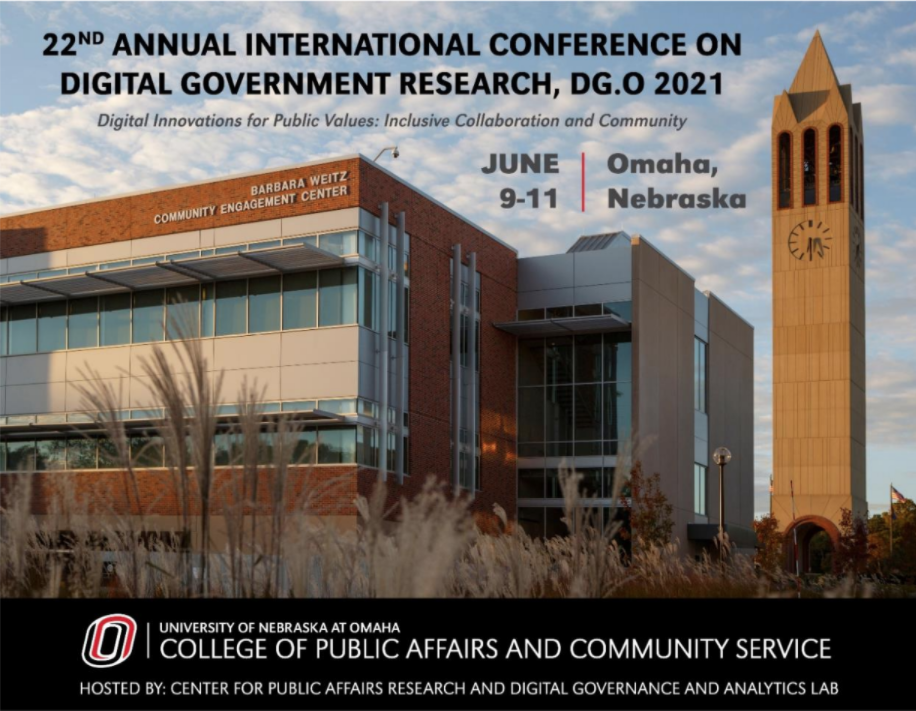

dg.o 2021:
22nd Annual International Conference on Digital Government Research
Conference Theme: Digital Innovations for Public Values: Inclusive Collaboration and Community
College of Public Affairs and Community Service
University of Nebraska at Omaha
Omaha, Nebraska
United States of America
*** The dg.o 2021 conference will take place fully online.
June 9-11, 2021
The Digital Government Society (DGS) announces the 22nd Annual International Conference on Digital Government Research – dg.o 2021, with a theme ” Digital Innovations for Public Values: Inclusive Collaboration and Community. ” dg.o 2021 will be hosted by the Digital Governance and Analytics Lab, the School of Public Administration, the Center for Public Affairs Research, and the College of Public Affairs and Community Service at the University of Nebraska at Omaha, Omaha, Nebraska in the United States of America on June 9-11, 2021. The dg.o conferences are an established forum for presentation, discussion, and demonstration of interdisciplinary research on digital government, civic engagement, technology innovation, applications, and practice. Each year the conference brings together scholars recognized for the interdisciplinary and innovative nature of their work, their contributions to theory and practice, their focus on important and timely topics and the quality of their writing.
CONFERENCE THEME:
The 22nd Annual International Conference on Digital Government Research (dg.o 2021) will feature the main theme of “Digital Innovations for Public Values: Inclusive Collaboration and Community.” Public values – such as efficiency, equity, transparency, trust, etc. — serve as the compass and goals for the development and implementation of digital innovations for public service. Recent developments in digital innovations — such as artificial intelligence, IoT, blockchain, social networking platforms, 5G, etc.— offer strategic opportunities for public value creation. These digital innovations are tools for us to solve monumental challenges facing our society such as pandemics, climate change, and sustainable development. However, at the same time, the fast advancement of technologies could further accentuate the digital divide between individuals, organizations, communities, and nations.
Specifically, the conference aims to advance both research and practice of public value creation via digital innovations by leveraging collaboration and community-oriented solutions in an inclusive manner. Inclusivity bridges the digital divide in the development, access, and use of information and communication technology. Collaboration can span boundaries of organizations, sectors, and national borders. A community-oriented holistic approach integrates various technologies and stakeholders to create public values.
Conference Chairs
Yu-Che Chen, University of Nebraska at Omaha, USA, ychen@unomaha.edu
Luis Luna-Reyes, University of Albany, USA, lluna-reyes@albany.edu
Marijn Janssen, Delft University of Technology, the Netherlands, m.f.w.h.a.janssen@tudelft.nl
Conference Program (PC) Chairs
Jooho Lee, University of Nebraska at Omaha, USA, jooholee@unomaha.edu
Gabriela Viale Pereira, Danube University Krems, Austria, gabriela.viale-pereira@donau-uni.ac.at
Sungsoo Hwang, Yeungnam University, Korea, sungsoohwang@yu.ac.kr